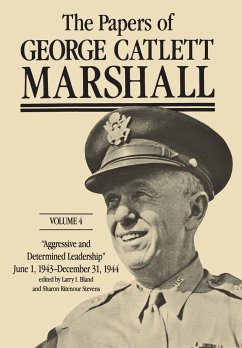Army Chief of Staff George C. Marshall's Pentagon office was the nerve center for United States ground and air forces during World War II. This fourth volume of The Papers of George Catlett Marshall covers the nineteen months that constituted the heart of American participation in the war, a period during which Marshall was operating at the peak of his abilities as a politician, strategist, and coordinator. Marshall was undoubtedly disappointed in late 1943 not to be chosen Supreme Allied Commander in Europe--a job that would have been granted to him had he demanded it. But many people, including President Roosevelt, considered him too important to America's war effort and to the alliance to move him out of Washington, D.C. As the documents in this volume demonstrate, Marshall directed great energy at maintaining and strengthening the crucial Anglo-American alliance through his participation in the great wartime decision-making conferences at Quebec, Cairo, and Teheran, and through his perseverance over strategic direction. This volume also reveals Marshall's efforts to maintain the alliances of army and navy services, ground and air forces, regular and reserve components, home front and combat theaters, military and civilian, and Pentagon and Congress. Army personnel increased to eight million by the end of these nineteen months, and Marshall moved vigorously to complete the creation, training, and transportation of combat units. He continually faced problems of logistics and shipping, research and development, finding exceptionally able leaders, and supplying support personnel. All the while, Marshall was planning for the postwar military by advocating Universal Military Training and a unified Department of Defense. "You are doing a grand job," he told General Eisenhower at the end of 1944, "go on and give them hell." The same might have been said of Marshall himself.
Hinweis: Dieser Artikel kann nur an eine deutsche Lieferadresse ausgeliefert werden.
Hinweis: Dieser Artikel kann nur an eine deutsche Lieferadresse ausgeliefert werden.








